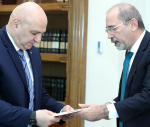You are here
Community radio gets a boost in Jordan
Feb 26,2014 - Last updated at Feb 26,2014
Community media received a major boost in Jordan this week with the launch of the third Aswatona conference at the Dead Sea.
More than 100 community radio activists gathered at the lowest spot on Earth to talk about the challenges of producing, broadcasting and sustaining community owned media, especially radio.
Community radio activists from areas not under the control of the Syrian regime were the stars of the event organised by a local Jordanian NGO, Community Media Network, and the UK-based Community Media Solutions in association with Jordan’s Audio Visual Commission and the World Association of Community Broadcasters.
Broadcasting radio in the Middle East and North Africa is a huge challenge. The post-colonial region witnessed many revolts and military coups that always included taking over national radio.
New powers were careful not to allow others to own radio stations so as not to have them do what they did when they took power.
For decades since, radio ownership has been the monopoly of governments. In recent years, private radio licences were given in some countries, usually to individuals who were very close to governing regimes and usually did not include news or public affairs content.
The revolutions and chaos witnessed by the region has been a godsend to community radio activists who used the absence of a centralised power to come up with locally owned radio stations, often using amateur equipment and untrained staff.
Aswatona, an initial network of seven countries (Libya, Tunisia, Egypt, Yemen, Jordan, Syria and Palestine) began with Swedish government funding that supported Internet radio in these countries.
Wherever possible, these Internet stations were able to turn into FM.
The network expanded with further funding from the Commonwealth office through Community Media Solutions, to include Algiers and Morocco, and to add many more Internet radio stations, especially in Palestine and Egypt.
More trainings took place in Libya and Tunisia.
UNESCO and other international bodies argue that radio should include three forms of ownership: state ownership in the practice of public service broadcasting, commercial radio and community owned (or civil society owned) community radio.
UNESCO considers supporting community radio in the world to be one of its top priorities.
New constitutions in Egypt and Tunisia gave strong impetus to citizens and local institutions owning broadcasting licences.
The International Telecommunications Union says that of the 6,000 frequencies available to the Middle East and North Africa only 10 per cent are being used.
Bureaucratic policies, restrictive laws and regulations, and exorbitant licence fees are holding back the growth of community owned broadcasting.
World Bank studies have shown that countries that support community radio are known to experience improved economic growth and a much more open environment for freedom of expression.
Jordan’s Parliament, which distributes radio licences based on a temporary 2003 audiovisual law, will soon debate a permanent law that will reduce some of the inadequacies.
Among the changes in the government-proposed law, as outlined by Director Amjad Qadi, is to create a board for the regulatory body and to have this organisation issue licences.
At present, the full Jordanian Cabinet must approve any application, and the government has the right to reject a request without giving an explanation.
Two applications for a station in Zarqa and Jofa, in the Jordan Valley, were rejected. A third application for a radio station in Deir Alla has been pending since May 20.
The convening of a community radio conference in Jordan has shown the diversity and pluralism in the region and the thirst that people of different ethnicities and backgrounds have for creating and owning media through which they can express themselves.
The more community radio is supported the more the region will move away from authoritarianism to decentralised democracy.












